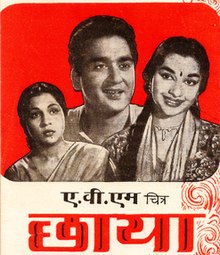
Parineeta is a 1953 Indian Hindi-language drama film starring Meena Kumari and Ashok Kumar, based upon the 1914 Bengali novella of the same name by Sarat Chandra Chattopadhyay. The film was directed by Bimal Roy. This version of the film is considered by many to be the most faithful adaptation of the novella, particularly due to Meena Kumari's interpretation of the role of Lalita.
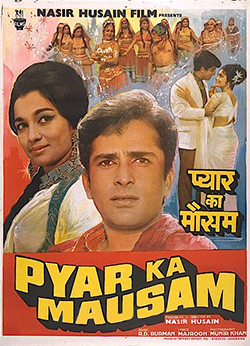
Pyar Ka Mausam is a 1969 Indian Hindi-language musical romance film under Nasir Hussain films banner. Its plot has much similarity to Hussain's own earlier film "Tumsa Nahi Dekha," with Ameeta and Shammi Kapoor in the lead roles. It starred Shashi Kapoor, and the Nasir Husain fixture- Asha Parekh. It also had Bharat Bhushan, Nirupa Roy, Madan Puri, Tahir Hussain and another Nasir Husain fixture Rajendranath. Nasir's nephew Faisal Khan who was 3 years old at the time plays Shashi Kapoor's character as a child. Two more Husain fixtures were responsible for the memorable songs: lyricist Majrooh Sultanpuri and music composer R.D. Burman. R.D.Burman also had an acting role in the film. The film became a Silver Jubilee Hit.
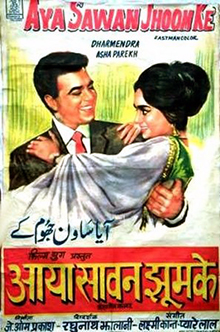
Aya Sawan Jhoom Ke is a 1969 film directed by Raghunath Jhalani. It became a box office hit. The film stars Dharmendra, Asha Parekh, Nazir Hussain, Nirupa Roy, Bindu, Aruna Irani, and Rajindernath. The music is by Laxmikant Pyarelal and the lyrics by Anand Bakshi. The songs were meaningful and also melodious. # 8 at Box-Office Collection list.

Love In Tokyo is a 1966 Indian Hindi-language romantic comedy film directed and produced by Pramod Chakravorty. The film was a hit at the box office.

Musafir is a 1957 Hindi film directed by Hrishikesh Mukherjee, being his directorial debut. The screenplay and story were written by Hrishikesh Mukherjee and Ritwik Ghatak respectively. The film is about a house and the lives of three families who live in it, so in essence, it is three stories linked by the house. The first part stars Suchitra Sen, Shekhar in the lead role; The second part stars Kishore Kumar, Nirupa Roy, in the lead roles; The third part stars Dilip Kumar, Usha Kiran in the lead roles. The film was a profitable venture for Hrishikesh Mukherjee.
Kali Ghata is a 1980 Hindi romantic thriller film produced and directed by Ved Rahi,the film stars Shashi Kapoor, Rekha, Danny Denzongpa in lead roles, with Aruna Irani, Lalita Pawar, Jagdeep, Nazir Hussain, A. K. Hangal in supporting roles. The music was composed by Laxmikant-Pyarelal, with lyrics written by Anand Bakshi.

Mujhe Jeene Do is a 1963 Hindi film, directed by Moni Bhattacharjee and written by Aghajani Kashmeri. This dacoit drama stars Sunil Dutt, Waheeda Rehman, Nirupa Roy, Rajendranath and Mumtaz.
Shehnai is a 1964 Indian Hindi family drama film directed by S. D. Narang. The film stars Biswajeet, Rajshree, Nirupa Roy, Leela Chitnis, Johnny Walker, Iftekhar and Asit Sen. The story was written by Gulshan Nanda and screenplay by Z. Hussain. The film's music was composed by Ravi. The songs "Na Jhatko Zulf Se Pani", "Kya Ajab Saaz Hai Yeh Shehnai", "Is Tarah Toda Mera Dil", "Kitni Jawan Hai Zindagi Kitni Jawan Bahaar" and others were written by Rajendra Krishan. The film is about a pilot’s widow who goes through hardship and loneliness in order to fulfil her husband’s last wish to make their son an Air Force pilot.

Sulochana Latkar, known by her screen name Sulochana, was an Indian actress of Marathi and Hindi cinema, who acted in 50 films in Marathi and around 250 films in Hindi. She was most known for her performances in Marathi films such as Sasurvas (1946), Meeth Bhakar (1949), Vahinichya Bangdya (1953), Dhakti Jaoo (1958) and Sangte Aika (1959) in the lead roles, as well as for the mother roles she played in Hindi cinema right from 1959 film Dil Deke Dekho to the year 1995. She and Nirupa Roy epitomized the "mother" roles right from 1959 until the early 1990s.
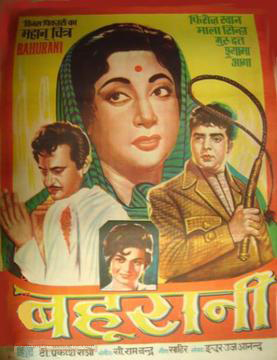
Bahurani (transl. Daughter-in-law) is a 1963 Indian Hindi-language drama film directed by T. Prakash Rao. The film stars Guru Dutt, Mala Sinha and Feroz Khan in pivotal roles.
Jhoola is a 1962 Hindi-language romance film written by Rajendra Krishan and directed by K. Shankar. The film starred Vyjayanthimala and Sunil Dutt in the lead, after their successful collaboration in Sadhna (1958). The lead actors were supported by Pran, Rajendranath, Manmohan Krishna, Achala Sachdev, Leela Mishra, Randhir, Raj Mehra, Mohan Choti, Indira Bansal, Kusum Thakur and Tun Tun. The film was produced by N. Vasudeva Menon and was distributed by Vasu Films. The film's score was composed by Salil Chowdhury with lyrics provided by Rajendra Krishan. Editing was done by Shivaji Awdhut and was filmed by K. H. Kapadia. The film is a remake of the Tamil film Kairasi (1960).

Hai Meri Jaan is a 1991 Indian Hindi-language film produced and directed by Roopesh Kumar. It stars Sunil Dutt, Hema Malini, Kumar Gaurav, Ayesha Jhulka, Nirupa Roy in pivotal roles.
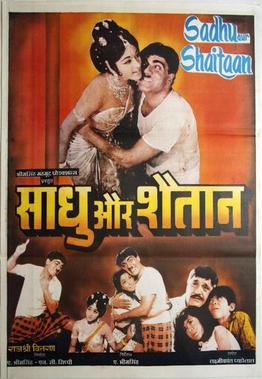
Sadhu Aur Shaitaan is a 1968 Hindi film directed by A. Bhimsingh. The film stars Om Prakash, Pran in title roles, with Mehmood, Bharathi, Kishore Kumar in lead roles. The movie is a remake of 1966 Tamil suspense-comedy Sadhu Mirandal.

Grahasti also called Grihasti, is a 1963 Indian Hindi-language drama film, directed by Kishore Sahu. Produced by S. S. Vasan for Gemini Studios, its music director was Ravi and the lyrics were written by Shakeel Badayuni. Pandit Mukhram Sharma wrote the dialogues with cinematography by P. Ellappa. The film starred Ashok Kumar, Manoj Kumar, Rajshree, Nirupa Roy, Indrani Mukherjee, Bipin Gupta, Lalita Pawar and Gajanan Jagirdar.
Maa (Mother) is a 1952 Indian Hindi-language social family drama directed by Bimal Roy for Bombay Talkies. Bimal Roy was asked to come to Bombay from Calcutta to direct the film for the studio, which was going through bad times. Bombay Talkies' earlier favourite Leela Chitnis was cast in the eponymous role of Mother. This was the first film Roy directed in Bombay. Later, he was to break away and form his own production company: Bimal Roy Productions. The first film he produced and directed under his new banner was Do Bigha Zameen (1953), the next year.
